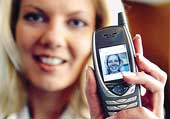 |
| Hidden eye: A camera cellphone |
Toronto, Dec. 15 (Reuters): The camera cellphone, one of the hottest items on this year’s Christmas gift list, is a growing privacy issue for both consumers and organisations.
The phones, with their discreet lens, tiny size and ability to immediately transmit images onto the Internet or other cellphones, are a voyeur’s dream.
The phones first appeared on the market in early 2001, and for the last several months, media reports out of Asia have called attention to incidents such as nude photographs of unsuspecting victims turning up on the web.
Their growing popularity in North America since their debut late last year has sparked similar concerns, prompting fitness centres across North America, from Los Angeles to Toronto, to begin banning or limiting cellphone use on their premises.
With locations including Beverly Hills and New York, The Sports Club/LA — one of the most luxurious fitness centres in the world — was among the first to ban all cellphones in July, limiting their usage only to the lobby.
Privacy is a priority for the centre, whose high-profile clientele include celebrities and other prominent figures, company spokesman Rebecca Harris said.
Other clubs have outright banned all cellphones because of the difficulty in distinguishing between regular cellphones and camera phones.
But not all clubs are taking such a hard-line stance.
In Calgary, where widespread bans and limitations drew media attention in Canada, the YWCA took a more moderate approach.
“Essentially, we’re basing it on the honour system, because we’re not going to ask every single person who walks into the door, ‘Do you have a camera cellphone?’ and ‘You need to check it’,” general manager Jan Bloemraad said.
The clubs know that members rely on their phones to stay in contact with children or work, and to ban them outright would not be in the members’ best interest. But clubs are keeping a close eye on what goes on in their gyms and say that members are happy they are taking action.
At a number of gyms, it was recent inquiries by the media that prompted them to consider the issue, rather than any particular incident.
“Certainly the media attention required us to be a little more forward in our approach,” Jack Kinch, YMCA spokesman for the seven Greater Toronto Area centres, said.
Concerns over camera phones have also seeped into businesses as companies fear corporate espionage. South Korea-based Samsung Electronics and LG Electronics have reportedly banned visitors from carrying camera phones, according to South Korean domestic media.
Concerns raised by the camera phones are unlikely to go away as technology improves and sales jump.
The next generation of phones making their way onto Asian markets and trickling into North America are video cellphones, which have the ability to record 15 to 30 second clips.
In North America, analysts project that camera phone sales will more than double next year, while the overall cellphone market will only see a small increase.
Of the 90 million handsets sold in North America this year, camera phones made up 3.3 per cent, or three million units. That’s out of the 65 million camera phones sold worldwide, according to David Kerr, an executive with Strategy Analytics, a Boston-based consulting firm.
The banning strategy may be an uphill fight, particularly with cameras and videos expected to be standard in half the cellphones available by 2008.










